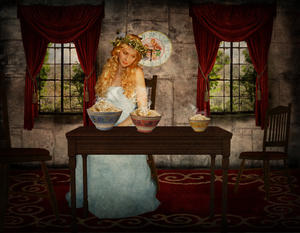OK, disclaimers upfront:
- Everything I’m going to say in this post is about my own taste.
- If your taste is different (entirely likely), that’s fine with me.
- Your taste being different doesn’t invalidate what I say about my own preferences, or, of course, vice versa.
- I nevertheless doubt that I’m the only one who feels this way.
Having got that out of the way, I want to talk about a spectrum in fiction writing that I’m going to call “freshness” versus “familiarity”. “Freshness” implies that the author is doing something new, seldom or never seen before, while “familiarity” means that they’re using elements (both genre elements and story elements) that have been around for a while.
Every book is somewhere on this spectrum. Finnegan’s Wake is probably about as far as you can go towards the freshness end without degenerating into random word-salad (and even that references earlier literature), and up the other end we have, I don’t know, fanfiction that’s just a rewriting of a scene in canon.
Now, straight away I’ve dropped an implication that freshness is better, and I don’t necessarily think that. I picked Finnegan’s Wake up once, and quickly concluded that I didn’t want to work that hard and probably wasn’t that smart, and put it down again. Certainly, though, freshness is harder.

- violscraper / Foter / CC BY-NC
For me, the Goldilocks Zone on the freshness-familiarity spectrum is a broad one. I can enjoy a book like Charles Stross’s Halting State, for example, written in second person, or one of his posthuman novels like Glasshouse. I can also enjoy a book that’s very nearly pure vanilla D&D-style fantasy, or off-the-shelf space opera, as long as other aspects of the book (the characters, the writing, the plot) are well done – and have some freshness to them.
There is, though, such a thing as too much, and that applies both to freshness and to familiarity. I abandoned Walter Jon Williams’ Aristoi, for example, 25% of the way through, because I didn’t have a clue what was going on (and also didn’t care about the characters). I didn’t get past the sample for Hannu Rajaniemi’s The Quantum Thief, for a similar reason, even though I love heist novels. When too much is unfamiliar, I become disoriented and it’s easy for the book to lose my attention.
On the other hand, if I come across an epic fantasy in which the blacksmith’s boy loses his parents in the first chapter (when cruel, heartless, evil people destroy their village) and joins up with quirky and assorted companions in a quest for an artifact which, as the Chosen One, he is destined to wield against the Dark Lord, I pass it by. I’ve already read that story, and when I read it before it was probably better written.
There’s nothing inherently wrong with tropes, whether genre tropes or story tropes. I’m highly trope-tolerant. Oh, regardless of how much death and destruction is raining down, all of the core characters always survive, shrugging off significant injuries in insignificant amounts of time? OK, it’s one of those stories. I can live with that. (Though some tropes are easier to tolerate than others, and the others are usually the ones that allow the writer to take shortcuts in character development and plotting.)
Where I start to have a problem is if the whole thing, or almost the whole thing, is constructed out of tropes, as if someone had built a character, plot and setting generator out of the TV Tropes website and run it, then filled in the resulting outline with poorly-written prose. I think of those as paint-by-numbers books. There’s too much familiarity.
Sadly, a great many indie writers look out on the vast ocean of possibilities represented by the indie publishing revolution, in which they no longer have to write what the big publishers are buying in order to have a chance to reach an audience, but can create something genuinely new and fresh… and then they write another vampire romance with a whiny, annoying teenage heroine who’s simultaneously the most awesome person ever and too stupid to live.
Freshness is hard, yes. And familiarity is important. But if you want to succeed with me, and readers like me, you’re going to need to strike for the Goldilocks Zone.
Mike Reeves-McMillan lives in Auckland, New Zealand, the setting of his Auckland Allies contemporary urban fantasy series; and also in his head, where the weather is more reliable, and there are a lot more wizards. He also writes the Gryphon Clerks series (steampunk/magepunk), the Hand of the Trickster series (sword-and-sorcery heist capers), and short stories which have appeared in venues such as Compelling Science Fiction and Cosmic Roots and Eldritch Shores.

Leave a Reply
You must be logged in to post a comment.